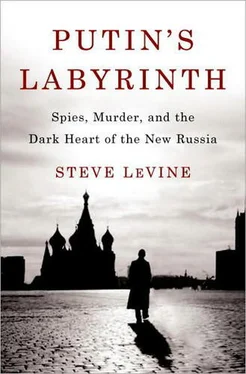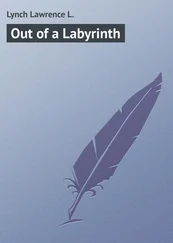ELENA BARANOVSKAYA, IRINA FADEEVA, AND ILYA LYSAK
Hostages in the 2002 terrorist takeover of a Moscow theater staging the musical Nord-Ost. From events before and after, the three were indelibly linked to Anna Politkovskaya.
BORIS BEREZOVSKY
Former Kremlin kingmaker largely responsible for Boris Yeltsin’s 1996 reelection, and for Vladimir Putin’s surprise elevation to power. He thought he would continue to manipulate events, but Putin rebelled and the two became blood enemies. Berezovsky is the financier of the London-based Putin opposition. His team included Alexander Litvinenko, the defector and former KGB officer.
NIKOLAI KHOKHLOV
The first-known victim of deliberate poisoning by a nuclear isotope. A KGB officer, Nikolai defected in 1954 while on an assassination mission; three years later, he survived the KGB’s attempt to assassinate him. He regarded the Litvinenko assassination as a replay of his own experience.
PAUL KLEBNIKOV
Editor of Forbes Russia and American-born scion of Russian aristocracy. Klebnikov’s best-known work was his highly critical biography of Berezovsky, whom he called “Godfather of the Kremlin.”
ALEXANDER LITVINENKO
Former KGB officer, defector, critic of Putin, and member of Berezovsky’s London-based opposition political team.
DMITRI MEDVEDEV
Law professor, chairman of Gazprom, and Putin’s hand-picked successor as Russian president.
ANNA POLITKOVSKAYA
Having grown up as a member of the Soviet Union’s privileged nomenklatura, Anna eventually became perhaps Putin’s fiercest critic, and a literary celebrity abroad.
VLADIMIR PUTIN
Anointed as president by an ailing Boris Yeltsin, who sought a successor who would protect his family from charges of corruption. Soaring oil prices under his rule transformed Russia from a broken country into an increasingly prosperous land with renewed global ambitions. But Putin also created an atmosphere of impunity for killers.
CHAPTER 1

Russia’s Dark Side
A Land in the Grip of a Brutal History
THE BOULEVARDS OF MOSCOW ARE VERY MUCH TWENTY-FIRST-CENTURY Russia, a kaleidoscope of flashing neon, ostentatious wealth, and the hectic traffic of a city too busy to stop. But walk down Maliy Karetniy Pereulok, a backstreet in the city’s prestigious central Petrovski district, and step through the wooden door of the simple red-brick building at number 12. Here, time reverses itself. Visitors find themselves inside a musty archive of repression. Photographs of Russians executed during Stalin’s purges in the 1930s are displayed in open shoe boxes. Storage boxes and cardboard file folders, their contents a history of state-sanctioned savagery, are stacked floor to ceiling along narrow corridors and crammed into seemingly every niche. Personal items that belonged to prisoners of the gulag invite inspection.
A human rights organization called Memorial, which documents the crimes of Stalinism past and present, maintains this museum and has its office here. The quarters have the feel of a relic, and the museum visitor traffic is low. But during the golden era of Mikhail Gorbachev’s perestroika—roughly from 1988 through the first half of 1991—the building buzzed with researchers, journalists, visitors, and foreign dignitaries. Curiosity about the Stalinist period was intense then. (Remarkably, the reform-minded FSB, which had replaced the KGB in a convoluted bureaucratic change in 1995, assembled the photographs of purge victims that ended up in the museum’s collection. “The current FSB wouldn’t do something like this, but then they did,” said Nikita Petrov, Memorial’s KGB expert. Petrov himself is a throwback to an earlier time, with long gray hair parted on the side, green T-shirt, denim jacket and pants, and trimmed gray beard.)
Perestroika was a flash in time when many Russians dared to hope for a break with the past. Tens of thousands marched in the streets for an evolving list of causes, scanned newspapers for the latest exposés of the Communist Party, and forced genuine change in the country. But when the economy crashed and the government of Boris Yeltsin wiped out their savings—not once, but twice—by summarily devaluing the ruble, Russians felt tricked.
Now Russia is again Russia, its dark side emergent and, for the most part, tolerated by the populace. Petrov, a chemist by training and a historian by profession, tried to explain why.
“Russian history taught its people to be indifferent toward the suffering of others at their death,” he said. “It’s hard to say whether history produced the culture or culture produced the history. Whichever, it’s the consequence. People are used to death. It’s a psychological defense toward death.”
To underline his point, Petrov turned to Europe. “In 2004, there was a terrorist act in Spain,” he said, referring to the Madrid train bombing by al-Qaeda that killed 191. “Lots of people went into the street in protest. That would never happen here. Why? Here it’s ‘Why should we go into the street? It would have no impact.’
“That’s actually quite a logical response. [But] it has resulted in people not being brave. They take no responsibility toward events—they can’t affect anything.”
Some have interpreted this detachment as an inevitable outcome of Putin-era prosperity—many Russians had never lived better and so were not motivated to challenge the system. But my own observation was that Petrov had it right—Russians had reverted to what they had always been, which was generally passive.
It was not hard to find evidence that the state had turned back to its old self, too. In 2004, Qatar convicted two Russian intelligence officers of murdering Chechnya’s former president, Zelimkhan Yandarbiyev, by blowing up his car in the tiny Gulf country. Moscow asked that the men be permitted to serve their sentence in Russia, and Qatar agreed. But once the officers were home, Russia set them free. That seemed to demonstrate that if one carried out a killing on behalf of the state—even if it was arguably terrorism—one would be protected. It reinforced an atmosphere of impunity for such crimes; there were few examples of anyone convicted for a major Russian murder. The Qatar episode and others like it mainly suggested that people should keep their heads down.
One of those who surprisingly did so was Olga Kryshtanovskaya, who for two decades was Russia’s premier expert on the nation’s elites and their wealth and position in government. Her most recent study, she told me over coffee, was a measure of the wealth accumulated by military officers and the FSB leadership under President Vladimir Putin, including their shares of ownership in Russia’s biggest companies. Almost offhandedly, I asked where the study would be published so that I could pick up a copy. I didn’t want to burden her with a request to send me one. She is an enormously busy woman, frequently published in Russia and the West and widely quoted on the Russian power structure. Even the Kremlin has sought her advice.
Her expression turned dark and awkward. She said she wasn’t sure where—or if—she would publish her findings. After so many years of demystifying the elite, she suddenly felt at risk. “This type of information is dangerous to life,” said the sixtyish woman. “A lot of people had unpleasant things happen to them. There can be accidental car crashes. A lot of people died and that is why I can’t stop thinking about it. I don’t know what I’m going to do.”
Читать дальше













